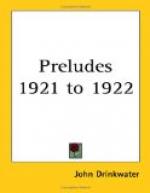.....
Down to the valley from their hills they came,
Lake Winter and the woman that he loved.
He waited by a long brown garden wall,
Mottled with moss and lichen, where in the dusk
Like a great moth a late flycatcher wove,
And watched her coming down a rutted path,
Towards him. And the flowing of her body,
Sure step through fugitive cadences of limb,
Up to the little golden arch of hair,
Was lovely as a known yet wanted tale.
.....
Zell Dane, the wife of Martin Dane, who held
Tollington Manor farm, was ten years wed.
Dane was an honest man by groom and horse,
Paid pew-rent and his losing wagers, thought
The British Empire lived at Westminster,
Stood by the State and rights of property,
Drank well, and knew the barmaids of a county.
He married Zell, and neither could have said
Why it was done. Ten years had gone since then,
And he was now a half forgotten habit,
She, some queer porcelain stuff beyond his knowing.
.....
Lake Winter came and went at Tollington,
As other neighbours, a little in Dane’s mind
Suspect for certain rumours of his birth,
But known for a straight rider and plain speaker,
Who meant his words and had words for his meaning.
And Lake and Zell, between the jests at table,
Where they could match the best wits of the room,
Would talk of things that Dane and the rest counted
As pointing ways not good for level minds.
Why pose about Beethoven, and Debussy,
Or these French fellows Degas and Picasso,
When there were Marcus Stone, and A Long, Long Trail,
And “A Little Grey Home in the West,”
that common folk
Could understand? And, however the truth might
be,
It wasn’t decent openly to say
That William Wordsworth was a better poet—
Though more or less in a poet was no matter—
Because it seemed that once in his flaming youth
He had loved gloriously in France....
. . . . .
Dane heard and saw,
And was a little troubled that clear heads
Should cloud and squander thus, a little scornful.
Still if it gave them pleasure, and it but meant
Mind with mind idling together so,
Winter could come and go for all he cared,
He wouldn’t grudge ... and then the doubt began,
A thought that somewhere under all this play
And nimbleness was crouching the true thing,
Lust, plain lust. There was between man and woman,
So Dane had learnt, two several conditions,
A compact to keep smooth the day’s affairs,
That, and plain lust. This mind play was a sham....
Winter and Zell were lusting, that was all...
Then let them... damn it, let the matter be...
Time would show all, and there were crops and hounds.
....
They stood together by the dusky wall.
And long their lips met, in a hushed world fading,
A night of beauty fading in their own.
And then “I made a rhyme for you to-day,
When the last sheaves were binding I made it,
thus—”




